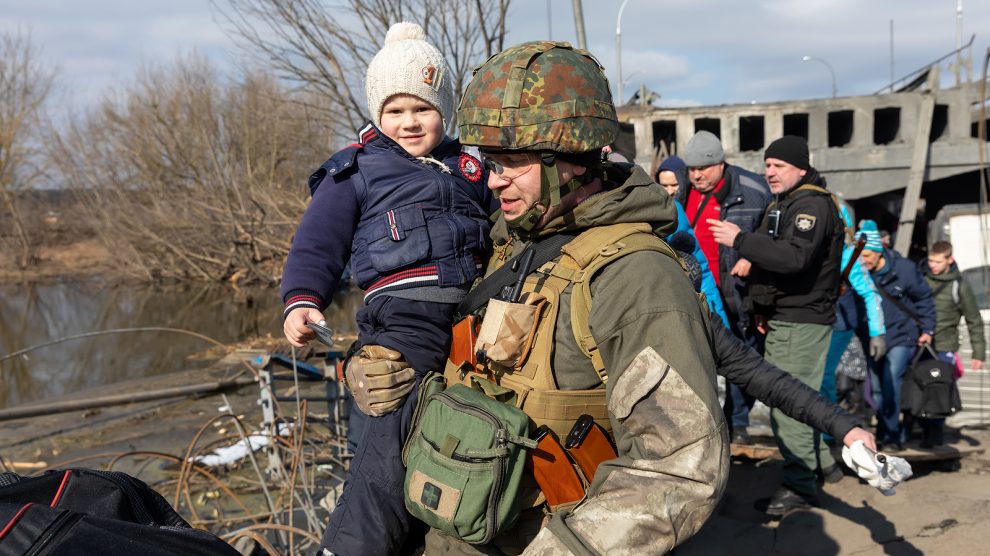Ukraine, at the war’s end, must be in a position to decide its own future, be that inside the European Union or not, be that as a member of NATO or not. Ukraine must be the master of its own destiny.
Half a hundred days since Russia launched its invasion of Ukraine, there appears to be no end in sight to the brutal aggression that the Moscow regime has inflicted upon its neighbour. War crimes – including acts of genocide, systematic torture, and even rape – have become commonplace as, unable to defeat the Ukrainian army, Russia has turned its attention to defeating the Ukrainian people.
- Ukraine’s wartime economy: Wounded but functional
- ‘We’ve never felt like refugees’
- Emerging Europe’s dependence on Russian energy goes beyond gas
On April 13, the mayor of besieged Mariupol said that some 21,000 civilians have been killed in the city and 100,000 are still awaiting evacuation. Before Russia’s invasion, the strategic port city had a population of about 450,000.
Earlier this week, US President Joe Biden went so far as to openly accuse Russian President Vladimir Putin of committing a genocide in Ukraine. When asked for clarification, Biden doubled down.
“Yes, I called it genocide. It has become clearer and clearer that Putin is just trying to wipe out the idea of even being able to be Ukrainian.” The International Criminal Court has called the entire country “a crime scene”.
Moving, humbling resilience
While the outcome of the war is yet unknown (although Ukraine increasingly looks invincible militarily), what has been abundantly clear since day one is that ordinary Ukrainians are as fearless, bold, and stout in their resistance as the country’s armed forces.
Their resilience is at once moving and humbling, a reminder that the defence of freedom requires levels of bravery that few of us will ever be asked to call upon.
Then there’s the economy, holding up remarkably well despite the devastation brought on the country. Economic activity has continued where possible, in all sectors, not least in IT which is still operating at around 85 per cent of its pre-invasion capacity.
In areas around Kyiv recently liberated by the Ukrainian army (as well as in Kyiv itself, where the immediate danger of a brutal Russian occupation has passed), shops, cafes, restaurants and other businesses are reopening.
Some of the almost 4.5 million people who fled abroad to escape the fighting are beginning to return: the Kyiv government estimates that some 800,000 people have returned to the country over the past couple of weeks. Others intend to do so as soon as possible.
Just this week we spoke to a number of people in various locations around the world, from Namibia to the United States, who all expressed their intention to return.
No return to the status quo
With Russia now concentrating its military push in the east of Ukraine, a return to the status quo ante bellum – relative peace and normality in the west, conflict in the east – looks to most observers increasingly likely.
But there is a key difference between now and 2014, when Russia first occupied parts of the Luhansk and Donetsk regions, as well as Crimea: Ukraine is determined to win. It does not want a return to the status quo, it does not want a conflict (frozen or otherwise) in its east. Ukraine is fighting to repel Russia once and for all, to reinstate its full territorial integrity.
It should be offered everything it needs to succeed. Weapons, financial and logistical support, and further punitive sanctions against Moscow. Russia must exit this war crippled, its economy in tatters, so that it never again launches an unprovoked attack against a peaceful, sovereign state.
Alas, despite Ukraine’s suffering, despite the pleas of its president Volodymyr Zelensky (whose leadership in this war will one day soon be the subject of serious academic inquiry by the world’s finest academic minds), Ukraine’s Western allies are not as united as they would otherwise have us believe.
Poland and the Baltic states have led the way, unerring in their support (the Warsaw government in particular taking the opportunity to wash away a multitude of sins), but others have faltered.
France wobbles. Germany, unable to wean itself off Russian energy, has become an embarrassment. Hungary, whose newly reelected prime minister Viktor Orbán appears to view Zelensky as a bigger threat than Putin, an outright liability.
For their freedom, and ours
Finally, I have a word for the appeasers, for those who would prefer to see a “negotiated” settlement, a “neutral” Ukraine perennially weakened and at the mercy of Russia.
You are not advocates of peace. You are enablers of Russian imperialism. Those of you on the right are an affront to the ideals that you claim to uphold: self-determination and sovereignty. Those of you on the left meanwhile betray the ideals of international socialism and solidarity.
Ukraine, at the war’s end, must be in a position to decide its own future, be that inside the European Union or not, be that as a member of NATO or not. Ukraine must be the master of its own destiny. That’s what people are dying for, and it is cause we should all continue to support.
It’s called freedom, and Ukraine is fighting for both its own, and for ours.
Слава Україні!
Unlike many news and information platforms, Emerging Europe is free to read, and always will be. There is no paywall here. We are independent, not affiliated with nor representing any political party or business organisation. We want the very best for emerging Europe, nothing more, nothing less. Your support will help us continue to spread the word about this amazing region.
You can contribute here. Thank you.




Add Comment